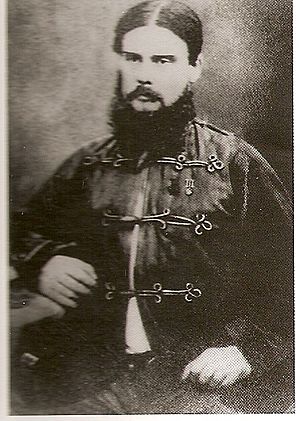Robert Shebbeare facts for kids
Quick facts for kids
Robert Haydon Shebbeare
|
|
|---|---|
 |
|
| Born | 13 January 1827 Clapham, London |
| Died | 16 September 1860 (aged 33) |
| Buried |
Buried at sea
|
| Allegiance | |
| Service/ |
Bengal Army |
| Years of service | 1844–1860 |
| Rank | Captain |
| Unit | 60th Bengal Native Infantry |
| Battles/wars | Indian Mutiny Second Opium War |
| Awards | Victoria Cross |
Robert Haydon Shebbeare (born January 13, 1827 – died September 16, 1860) was a brave English soldier. He received the Victoria Cross, which is the highest award for courage given to British and Commonwealth soldiers. It's given for showing amazing bravery when facing an enemy.
Contents
Early Life and Education
Robert went to school at King's College School in London. This school was connected to King's College London. Interestingly, one of his school friends, Philip Salkeld, also received the Victoria Cross. They both earned this award for their brave actions on the same day during a battle in Delhi.
Adventures in India
In 1844, when Robert Shebbeare was just seventeen, he left his home near London. He joined the 60th Bengal Native Infantry as a young officer in training. He went to India to start his military career.
After serving for 12 years, Robert found himself in the middle of the Indian Mutiny. This was a very important and challenging time. He showed great courage during these events.
Fighting in the Mutiny
Robert and other officers managed to escape to Delhi. There, he joined a group of soldiers called the Guides. He took part in many battles during the hot summer of 1857. He was wounded six times during this period.
He wrote a letter to his mother about his injuries. He said he was hit by three bullets on July 14. Then, he was hit by another bullet on September 14. He also mentioned that two musket balls went through his hat. One of them slightly grazed his head, causing a bad headache. The second one cut through his thick turban and knocked him down. Luckily, it didn't cause a serious injury. On the same day, a ball hit his jawbone. It made him bleed a lot, but it wasn't a severe wound.
Fighting in China
Later, Robert Shebbeare helped create a new group of soldiers. They were called the 15th Punjab Pioneers. These soldiers volunteered to go to China. They took part in the Second Opium War in 1860. They helped advance towards the city of Peking.
Journey Home and Sad News
By the age of 33, Robert had been away from England for 16 years. He had risen from a young officer to a Captain. He had fought in two wars and won the highest award for bravery. He was finally sailing back home from China to see his family.
His family was waiting at the port to welcome their hero home. But they received very sad news. Robert had died during the journey. He likely died from an illness, possibly malaria. He was buried at sea in the East China Sea.
Robert Shebbeare's family includes Lieutenant Colonel Robert A Shebbeare. His great-great-nephew is Sir Tom Shebbeare, who is also a notable person.
 | Mary Eliza Mahoney |
 | Susie King Taylor |
 | Ida Gray |
 | Eliza Ann Grier |

